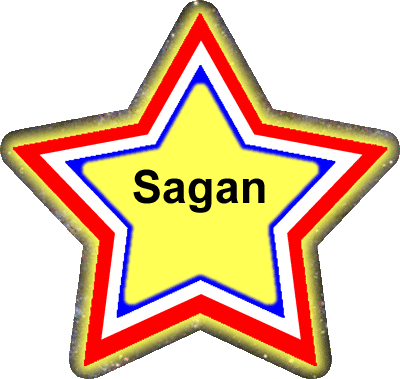 |
ALPHABETICAL BRAIN® VOCABULARY
CARL SAGAN'S SCIENTIFIC ACHIEVEMENTS
July 6, 2022

Note:
Carl Sagan was Professor of Astronomy and Space Sciences and Director of the Laboratory for Planetary Studies at Cornell University. He played a leading role in the Mariner, Viking, and Voyager spacecraft expeditions to the planets, for which he received the NASA medals for Exceptional Scientific Achievement.
In addition, he received the Pulitzer Prize and the highest awards of both the National Academy of Sciences and the National Science Foundation, and many other awards, for his contributions to science, literature, education, and the preservation of the environment. Sagan has written many important science books about biology, evolution, astronomy, and the human brain, which should be read and discussed throughout the Humanist Galaxy
Also Sagan produced and narrated the most popular and comprehensive up-to-date documentary film about the Universe in 1980 for PBS TV. It was called Cosmos. A companion book, called "Cosmos," accompanied the Peabody Award winning TV series. The book had an introduction by Sagan's 2nd wife and writing partner, Ann Druyan.
Cosmos was the first science TV blockbuster, and Carl Sagan was its (human) star! By the time of his death in 1996, the series had been seen by half a billion people! According to some biographers, Sagan was perhaps the best-known scientist on the planet at that time.
In helping NASA with U.S. space missions to Venus, Mars, and Jupiter, he made the highly regarded discovery of the high surface temperatures of Venus. He also worked on understanding the atmospheres of Venus and Jupiter and seasonal changes on Mars. Sagan's own interest and enthusiasm for the universe were so vivid and infectious, and his screen presence so engaging, that viewers and readers could not help but be caught up in his vision of the universe. From stars in their "billions and billions and billions" famous phrase that became the slogan for the entire Cosmos PBS TV series to the amino acids in the primordial ocean, Sagan communicated a strong positive feeling for science as a process of discovery.
Sagan's PBS TV documentary about the universe, Cosmos, inspired the more recent educational 13-part network TV series hosted by Neil deGrasse Tyson that included a book with a foreword by Neil deGrasse Tyson for the reprint edition and a set of DVDs published by Ballantine Books in 2013, 2014 (432 pages)
.
Both the PBS TV series and the accompanying book were called Cosmos and contained more than 30 years of new astronomical discoveries placed within the history of science.
Sagan's books include the following popular books: [1] THE DEMON-HAUNTED WORLD: Science as a Candle in the Dark reprint edition published by Ballantine Books, 1997 (457 pages); [2] PALE BLUE DOT: a Vision of the Human Future in Space reprint edition published in 1997 (384 pages); and [3] DRAGONS OF EDEN: Speculations on the Evolution of Human Intelligence reprint edition published by Ballantine Books, 1986 (288 pages).
Also, Sagan wrote the popular science fiction novel, Contact: first published in 1985 and later reprinted by Pocket Books in 1997 (448 pages). It is an imaginary tale about the first contact with extraterrestrials in 1999 at the turn of the millennium. The book was made into a popular film about the first contact with human-like life on other planets!.
Note: Book outlines and reviews
will be online very soon.

Click or Tap Star to:

RETURN TO HUMANIST HUB
OF SECULAR SCIENCE STARS
ALPHABETICAL BRAIN® VOCABULARY

produced by
Infinite Interactive Ideas®
|
|
 |